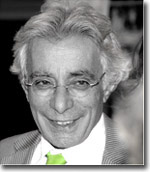

|
Tobie
Nathan 

Tobie Nathan was born in Cairo, Egypt, in 1948. Educated
in France. Ph.D. in Psychology (1976), Ph.D. in Arts and Sciences
(Doctorat d’Etat) (1983) |

Teaching Assistant, then Assistant Professor at the University
of Paris 13. Since 1986, Professor of Clinical Psychology and Psychopathology
at the University
of Paris 8. |

Tobie Nathan’s areas of interest are: psychoanalysis,
psychotherapy, ethnopsychiatry. |

Nathan has always been concerned with the ties between
psychopathology, clinical practices and the social environment and
is an Expert Psychologist at the Paris Court of Appeal. |

In 1979, Tobie Nathan created the first ethnopsychiatry
consultation in France, in the Department of Child and Adolescent
Psychiatry of Avicenne Hospital (Bobigny). |

In 1993, he founded the Georges
Devereux Center, academic center providing psychological assistance
to immigrant families, in the Department of Psychology of the University
of Paris 8 – a center he directed from 1993 to 1999. The center
is the first psychological treatment center within an academic psychology
department in France. It brings together within a single space on
the university’s campus at Saint-Denis a specific treatment
approach, academic research in psychopathology and psychotherapy
and graduate training. |

In 1978, together with Georges Devereux, Nathan started
the first French-language ethnopsychiatry journal –
Ethnopsychiatrica – published between 1978
and 1981. Then, in 1983, he founded the Nouvelle
revue d’ethnopsychiatrie, published by the Editions
de la Pensée sauvage (Grenoble), which put out 36 issues
between 1983 and 1998. |

Since February 2000, he is the editor of a new journal,
Ethnopsy : les mondes contemporains de la guérison
( Ethnopsyc. Contemporary
Worlds of Healing), published by Les Empêcheurs
de penser en rond, in Paris. |

From 1996 to the beginning of 2000, he directed the Department
of Psychology at the University of Paris 8. |
| |
| |
| |
 Since September 1st 2009, he is the Cultural Counselor in
the Embassy of France in Conakry (Guinea).
Since September 1st 2009, he is the Cultural Counselor in
the Embassy of France in Conakry (Guinea). |

Also a novelist, he has published four novels and is co-author
of a play. Tobie Nathan won "Emmanuel
Roblès" Prize for his first novel, Saraka Bô,
in Blois, in 1994. |
Major works :
- À qui j'appartiens?
Écrits sur la psychothérapie, sur la guerre et sur
la paix. Paris, Le Seuil — les empêcheurs de penser
en rond, 2007;
- Nous ne sommes
pas seuls au monde, Paris, Les empêcheurs de penser
en rond, Le Seuil, 2001,
- L'influence
qui guérit, Paris, Odile Jacob, 1994,
- Éléments
de psychothérapie, Paris, Odile Jacob, 1998,
- Saraka Bô,
roman, Paris, Rivages, 1993,
- 613, roman, Paris,
Odile Jacob, 1999,
- Serial Eater, roman,
Paris, Rivages, 2004,
- Mon patient Sigmund
Freud, roman, Paris, Perrin, 2006.
- Qui
a tué Arlozoroff ? Roman, Paris, Grasset, 2010.
|
|
| |
 African
gods — a book by Daniel Lainé, presents
photo portraits of men and women during rituals, exorcisms, dances,
magic spells in Benin, Gabon, Nigeria, Togo, Ghana, South Africa and
Cameroon. Introduction by Tobie Nathan. African
gods — a book by Daniel Lainé, presents
photo portraits of men and women during rituals, exorcisms, dances,
magic spells in Benin, Gabon, Nigeria, Togo, Ghana, South Africa and
Cameroon. Introduction by Tobie Nathan.
|
![]()